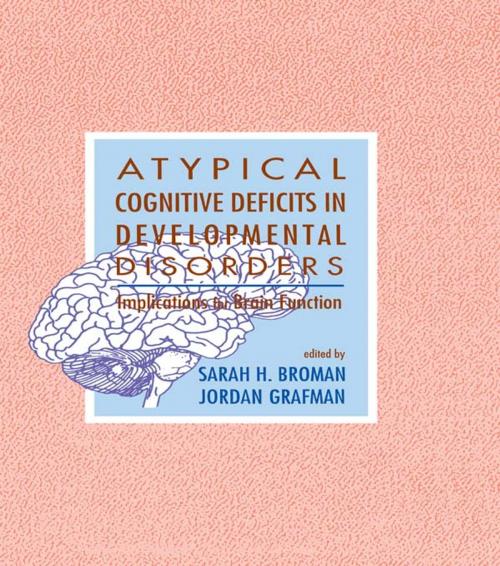Atypical Cognitive Deficits in Developmental Disorders
Implications for Brain Function
Nonfiction, Health & Well Being, Psychology, Neuropsychology| Author: | ISBN: | 9781317782179 | |
| Publisher: | Taylor and Francis | Publication: | February 25, 2014 |
| Imprint: | Psychology Press | Language: | English |
| Author: | |
| ISBN: | 9781317782179 |
| Publisher: | Taylor and Francis |
| Publication: | February 25, 2014 |
| Imprint: | Psychology Press |
| Language: | English |
This volume is based on a conference held to examine what is known about cognitive behaviors and brain structure and function in three syndromes and to evaluate the usefulness of such models. The goal of this endeavor is to add to the knowledge base of cognitive neuroscience within a developmental framework. Most of what is known about the neurological basis of cognitive function in humans has been learned from studies of central nervous system trauma or disease in adults. Certain neurodevelopmental disorders affect the central nervous system in unique ways by producing specific as opposed to generalized cognitive deficit. Studies of these disorders using neurobiological and behavioral techniques can yield new insights into the localization of cognitive function and the developmental course of atypical cognitive profiles.
The focus of this book is a discussion of the multidisciplinary research findings from studies of autism, and Williams and Turner syndromes. The approaches, methods, techniques, and findings reported are at the cutting edge of neuroscience research on complex behavior patterns and their neural substrates. Each disorder is accompanied by some degree of general cognitive impairment or mental retardation. Of greater interest are the atypical deficits in which a cognitive function is spared, such as language in Williams syndrome, or is disproportionately depressed as are spatial discrimination skills and visual-motor coordination in Turner syndrome. Drastically reduced or seemingly absent language capabilities and little interaction with other people characterize the core autism syndrome. A comprehensive and critical discussion of appropriate statistical techniques is made vivid by examples given from studies of small groups or single subjects in neurolinguistics and related fields.
This volume is based on a conference held to examine what is known about cognitive behaviors and brain structure and function in three syndromes and to evaluate the usefulness of such models. The goal of this endeavor is to add to the knowledge base of cognitive neuroscience within a developmental framework. Most of what is known about the neurological basis of cognitive function in humans has been learned from studies of central nervous system trauma or disease in adults. Certain neurodevelopmental disorders affect the central nervous system in unique ways by producing specific as opposed to generalized cognitive deficit. Studies of these disorders using neurobiological and behavioral techniques can yield new insights into the localization of cognitive function and the developmental course of atypical cognitive profiles.
The focus of this book is a discussion of the multidisciplinary research findings from studies of autism, and Williams and Turner syndromes. The approaches, methods, techniques, and findings reported are at the cutting edge of neuroscience research on complex behavior patterns and their neural substrates. Each disorder is accompanied by some degree of general cognitive impairment or mental retardation. Of greater interest are the atypical deficits in which a cognitive function is spared, such as language in Williams syndrome, or is disproportionately depressed as are spatial discrimination skills and visual-motor coordination in Turner syndrome. Drastically reduced or seemingly absent language capabilities and little interaction with other people characterize the core autism syndrome. A comprehensive and critical discussion of appropriate statistical techniques is made vivid by examples given from studies of small groups or single subjects in neurolinguistics and related fields.















